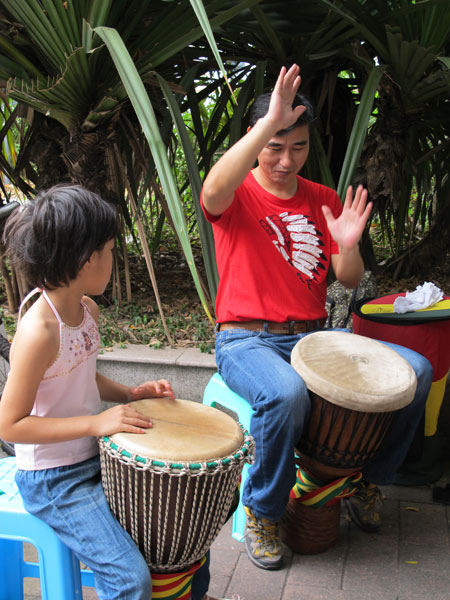 |
|
Zeng tries to impart a sense of rhythm to his students with the dejembe. Chen Wenli / for China Daily |
"With the teacher's help, my djembe playing improved a lot. I then came up with the idea of starting a djembe class, not only to broaden the instrument's popularity, but also to encourage other players to become teachers."
He now runs a djembe shop and can often be seen and heard playing in front of the building. His classes are held at all levels, from beginner to advanced.
"In my first class, the African teacher told me that anyone, no matter where they come from or how old they are, can become a good djembe player relatively easily as long as they have good hands and are willing to learn."
Some of his friends take his classes in the park, and they play in a square nearby almost every day, attracting large audiences, he says.
"If someone is attracted by the sound and is brave enough to ask about learning to play, they are the students we are looking for."
As with all musical instruments, the key to mastering the djembe is practice, he says.
Luo Zihong, 10, who has studied with Zeng for about a year, says: "In addition to classes, I usually practice 10 to 20 minutes at home every day. With others, I can now play a complete song."
Luo first got to know the djembe when he lived in Egypt, where his father works, and took lessons. He lived there for three years and returns to the country during summer holidays.
"The instrument has a strong sense of rhythm, and it's not very difficult to learn. Although my hands are numb and hurt after 15 minutes' practice, I will keep playing the djembe," he says.
He has also begun to play the drum ensemble.
Nicole Luederitz from Germany is the only non-Chinese student in the class.
After graduating from Berlin University with a degree in Chinese studies, Luederitz came to China to continue studying at Wuhan University. In the summer of 2008, she came to Shenzhen and heard about the djembe class there.
"I have been interested in African culture ever since I was a child. I played the djembe in Berlin but never had systematic study. So I didn't want to miss this opportunity," she says.
She would love to go to Africa and play the djembe with other players there, she says.
After the interview, Luederitz carries a stool from Zeng's shop to the square, preparing for her class. Zeng and his students are all sitting in a circle under a tree.
"The main reason we play outside is that I want to take my students back to nature, especially the children who are obsessed with computers," Zeng says, adding that it is good for the players' ears and to get a breath of fresh air when they play the djembe outdoors.
Zeng says his job is to help his students pass the beginning level this year. Next year, he will switch to teaching an advanced class, and some of his experienced students will end up being teachers.
"I hope that in that way we can cultivate more djembe teachers and get more people to take lessons," he says.
Chen Wenli contributed to this story.
|
|
|
|
|
|
|
|
